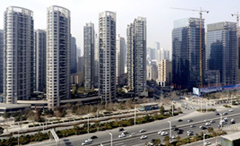China’s property market to cool on tough curbs
2017-11-20
Xinhua
China’s property market is expected to cool in the fourth quarter as real estate investment growth faltered, monthly property sales value dropped and home prices declined in hotspot cities, economists said.
The property market remained stable in October, with new residential housing prices seeing slower growth year on year in 13 of the 15 major cities considered the hottest markets, including Beijing, the National Bureau of Statistics (NBS) data showed.
“The investment and speculation fever in the country’s property market has been dampened this year by a new round of cooling measures,” said Yan Yuejin, senior researcher with E-house China R&D Institute.
In the first 10 months, property investment rose 7.8 percent from a year earlier, compared with 8.1 percent in the January-September period. The figure focuses largely on residential real estate but also includes commercial and office space.
“Given there is little room for home prices in the 70 large and medium-sized cities surveyed to rise, price growth on a yearly basis is expected to stay on a downward track,” said Yan.
Last month, home prices in the biggest cities softened slightly and gains in smaller cities slowed, the NBS data showed.
“It is the first time since 2016 that home prices in 10 hotspot cities witnessed year-on-year drops in October, in contrast with only three cities in September. The home buying fever has been cooled in hotspot cities amid tough government curbs,” said Zhang Dawei, a Centaline Property analyst.
Sales by value fell by 1.7 percent year-on-year in October compared to a 1.6-percent gain in September, the first decline in monthly property sales value since March 2015, according to the NBS data.
On a yearly basis, both new and second-hand home prices in first-tier cities reported slower growth for the 13th consecutive month in October. New home prices in smaller second- and third-tier cities also witnessed continuous year-on-year drops.
“Twenty of the 70 large and medium-sized cities saw second-hand home price declines last month, seven cities more than in September. The declining trend has maintained for months, showing an overall cooling property market,” said Yang Hongxu, deputy head of E-house China R&D Institute.
Since late last year, dozens of local governments have passed or expanded restrictions on house purchases and increased the minimum down payment required for a mortgage.
The property market was also cooled by relatively tightened liquidity conditions as the government moved to contain leverage and risk in the financial system.
Latest data from the People’s Bank of China showed that loans to the real estate sector continued to grow at a slower pace, with outstanding loans up 22.8 percent year on year to 31.1 trillion yuan ($4.7 trillion) by the end of September, 1.4 percentage points lower than the rate seen at the end of June.
Recent policies have showed the government will not loosen its stance in curbing property speculation, and that will limit the upward potential for housing prices, said Bank of Communications in a research note.
Authorities stepped up measures to act against irregularities in property financing earlier this month, prohibiting property developers, real estate agencies as well as Internet finance and micro-loan companies from offering illicit down payment financing for buyers.
Despite tough curbs, property sales are still hot in some cities, leading Chengdu and Nanjing to start a lottery-like registry system for home buyers to restrict property purchases, according to Zhang.
“The government will continue to toughen regulation, spreading measures to hot second- and third-tier cities, and even fourth-tier cities,” said Zhang.

